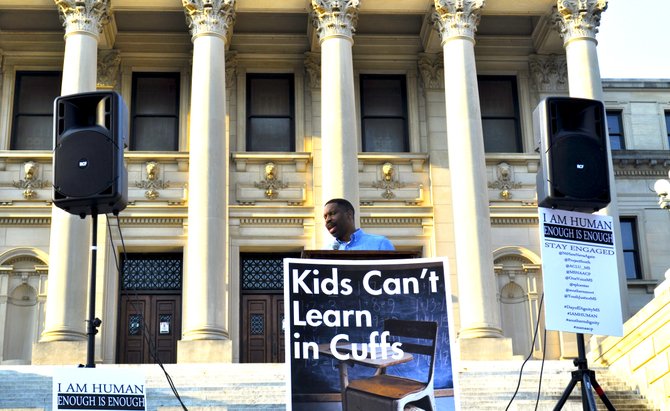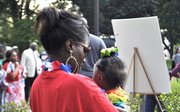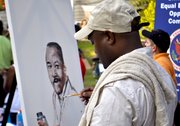Derrick Johnson, president of the Mississippi State Conference NAACP, at Jackson's Day of Dignity. Photo by Trip Burns
As dusk fell at the Mississippi Capitol yesterday, the crowd had dwindled from about 500 people who were present at the start of the Day of Dignity social-justice awareness rally to a handful of organizers and hardcore citizen activists.
Jaribu Hill, executive director of the Mississippi Workers' Center for Human Rights, spoke from the podium on the south steps of the statehouse and said reform-minded citizens should build up their stamina if they couldn't handle a two-hour-long rally.
"Our ancestors worked from sunup to sundown," Hill said of her enslaved forbearers.
Jackson's Day of Dignity coincided with the 50th anniversary of the 1963 March on Washington for Jobs and Freedom, but the Day of Dignity was less about commemorating the historical march and Dr. Martin Luther King Jr.'s "I Have a Dream" speech, than reminding attendees that obstacles to justice and equality in Mississippi are formidable.
"We are still fighting to ensure equality is provided to all children," Derrick Johnson, president of the Mississippi State Conference NAACP, said.
Advocates from a number of nonprofit organizations used the platform to tout successes and talk about the work that remains. For example, representatives from the Mississippi Low Income Child Care Initiative announced what it considers a major victory. On Wednesday, a Hinds County Chancery Court judge issued a permanent injunction against a Mississippi Department of Human Services finger-scanning program.
Advocates for poor families criticized the program, which required low-income parents to scan their fingers when dropping off and picking up their children at child-care centers. Those opposed to the program said it discriminates against parents who receive government subsidies as well as the centers that participate in the low-income subsidy program.
Jennifer Riley Collins, executive director of the Mississippi ACLU, pointed out that the United States is "the world's No. 1 incarcerator" and that Mississippi has the nation's second-highest incarceration rate in the nation, just behind Louisiana.
Jed Oppenheim, a senior advocate at the Southern Poverty Law Center and one of the Day of Dignity's organizers, called Mississippi's high rate of mass incarceration undignified.
"We need to write our own laws, our own local policies," Oppenheim told the audience.
Several veterans of the civil-rights movement on hand linked issues activists were fighting for in the 1960s to the problems of today, many of which remain the same.
Bill Chandler, director of the Mississippi Immigrant Rights Alliance, drew parallels between the struggle to protect the rights of immigrants in Mississippi and around the nation, which he said are part of the broader fight for workers' rights and equality.
Jackson Mayor Chokwe Lumumba echoed the call for equality in his remarks to the rally.
"We must be militant in the pursuit of that equality," Lumumba said. "We can't be timid in the pursuit of that equality. Sometimes, we can't even be nice in the pursuit of that equality".






Comments